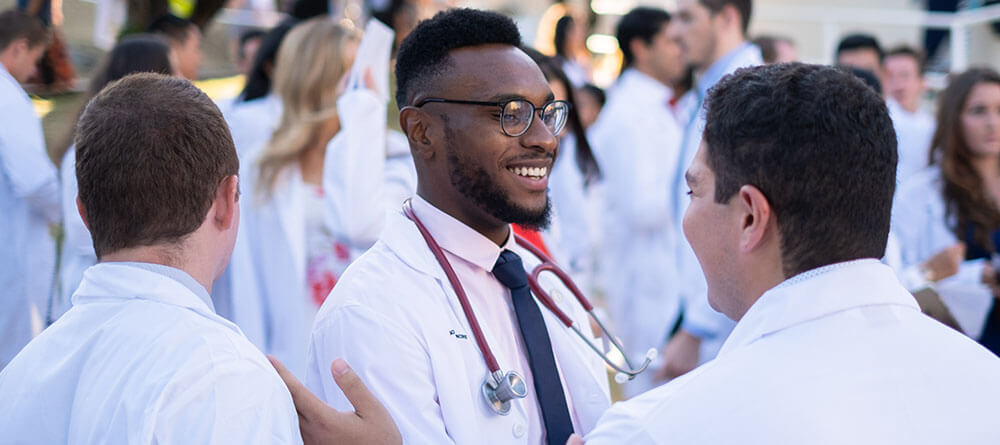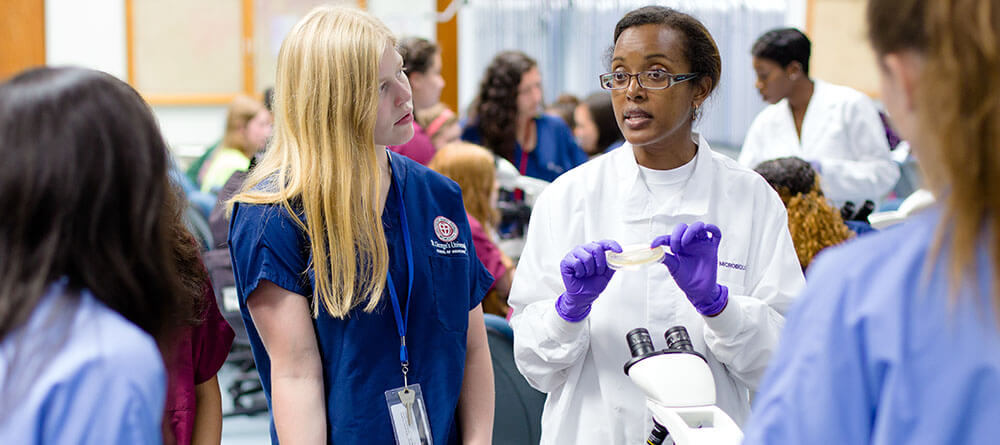For aspiring physicians who didn’t choose the typical pre-med path in college, completing a postbaccalaureate pre-medical program—postbacc pre-med program for short—can be the perfect way to complete all the necessary prerequisites for an MD program.
But some postbacc pre-med programs will be more effective in preparing you to pursue a medical school than others. The key is in knowing what to look for. We’re reviewing some of the top features to look for in a postbaccalaureate pre-medical program.
Important criteria for a postbacc pre-med program
While it’s possible to work through individual courses on your own, Dr. Lauren Sussman, a St. George’s University (SGU) graduate and pediatric resident physician at Albany Medical Center, notes that pursuing a postbacc was extremely helpful in her own journey toward entering an MD programs. SGU’s postbacc pre-med curriculum provides a clear framework and structure for the courses you’ll be expected to master.
“As much as you can enroll in classes on your own, the structure of a postbacc program is a lot more conducive to helping you fulfill the goal of getting into medical school,” Dr. Sussman explains.
If you’ve determined that a postbaccalaureate pre-medical program is the route for you, consider the following criteria to help you evaluate your options.

1. High academic standards
Medical schools typically have high expectations when it comes to academics. Data from the Association of American Medical Colleges (AAMC) shows that students with the highest GPAs are the most likely to gain acceptance. And the GPA standards for Canadian schools are even higher, according to the Association of Faculties of Medicine of Canada (AFMC) . Strong scores on the Medical College Admission Test (MCAT) are equally important.
In addition to academic qualifications, some medical schools review applications more holistically. However, maintaining high educational standards is one way to ensure students are prepared for the challenging coursework ahead. With this in mind, it’s wise to look for postbacc options that carry similar expectations. SGU’s pre-medical program, for instance, recommends students have at least a 3.0 GPA.
“What medical schools are looking at, whether it’s SGU or another medical school, is your overall GPA, your science GPA, and your MCAT scores,” Dr. Sussman says. “For anyone who’s going to do a postbacc program, I think it’s essential to know that your grades and your performance are going to matter.”
2. Medical school linkage agreement
There are many postbaccalaureate pre-medical programs, but a lot of them are stand-alone offerings. In contrast, there are programs available that have established linkage agreements where they partner with one or more medical schools.
Although these partnerships don’t guarantee you’ll gain acceptance to medical school, they can certainly increase your likelihood of securing a seat in their doctor of medicine program. For instance, students who complete SGU’s postbaccalaureate program and meet a few other criteria are automatically granted admission to the SGU four-year MD program.
Dr. Sussman didn’t participate in a postbacc pre-med program that had a linkage agreement—looking back, she sees how useful it can be to receive dedicated guidance. “I can’t emphasize enough that it’s really important to make sure that your program has some sort of advisement, whether it’s just making sure you know what classes you need to take and when or helping you with preparing to take the MCAT,” she offers.
The counselors, advisors, instructors, and other staff postbacc students interact with at SGU all possess in-depth knowledge of the medical school process, the specifics relating to The SGU School of Medicine, and the institution’s overall culture. Having access to this type of information can be incredibly valuable when you ultimately start the medical school application process.

3. Abundant student support
Researching the various resources available to students is a great way to identify quality postbacc programs. Consider looking for student services, like peer counseling, mentoring, tutoring, and learning strategy development. All SGU students have access to these programs and more through the school’s award-winning Department of Educational Services (DES).
If you can, try to get a sense of the program’s culture as well. Being able to access adequate support is particularly important for career changers and other nontraditional students who are adjusting back to being a student.
You might also consider getting involved with student organizations on campus. Many of these groups are dedicated to relevant medical fields and offer opportunities to develop your leadership skills. Pursuing a postbacc can also be a way to step out of your comfort zone and engage with people of diverse backgrounds, which can ultimately help you become a better physician.
4. Schedule and format that fit your needs
Postbacc pre-med programs can vary quite a bit in terms of duration. If you’re motivated to start medical school as soon as possible, it’s helpful to know that SGU’s 43-credit postbaccalaureate program can be completed in just one year. At the same time, there are also students who recognize that they’d thrive in a more relaxed pace.
“For me, I needed the two years,” Dr. Sussman shares. “I would not have done as well in the classes if it was an accelerated program.” Finding a program with a pace that fit her learning style was key in helping Dr. Sussman transition into medical school with confidence.
It’s also important to choose your modality wisely. There are more online postbacc pre-med programs than there once were, which offers notable flexibility for busy students. Still, some pre-med students see advantages to attending a traditional, on-campus postbacc program.
“You have the benefit of knowing who your professor is and being able to go to their office hours for an in-person conversation,” Dr. Sussman explains. “In my experience, online programs don’t afford that as much.”

5. Research and academic opportunities
Lastly, consider what you want to participate in research or other academic endeavors while completing your medical school prerequisites. Dr. Sussman had a goal to get involved in research before applying to medical school, and this informed where she ultimately chose to pursue her postbacc. Once in the program, she was able to connect with a teaching assistant who was pursuing a PhD in marine biology.
“She found me a spot in her lab, and I was able to work on a number of projects,” Dr. Sussman recalls. “I even got to be the second author on a paper I helped her work on.”
Move one step closer to medical school
In some ways, completing a quality postbaccalaureate pre-medical program can give you an advantage over other medical students. It shows you’re certain that pursuing medicine is right for you while also ensuring your coursework will be rigorous enough to prepare you for medical school.
To learn more about how you can complete your science prerequisites and progress toward an MD program, learn about St. George’s University’s Postbaccalaureate Program.
This article was originally published in October 2022. It has since been updated to include information relevant to 2024.

